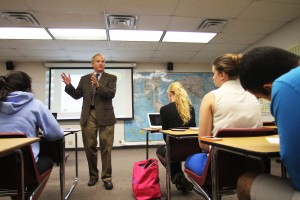

Matt Hellman | Lariat Photo Editor
By Alexa Brackin
news editor
Former U.S. congressman Chet Edwards, W.R. Poage Distinguished Chair for Public Service, made an appearance Monday to speak to students about the ins and outs of political ads and their effectiveness in elections.
Edwards adressed students from several journalism, speech and political science classes. He focused on the view of ads through a journalistic perspective and how a reporter in particular should care about campaign ads.
Edwards told the students in the room their jobs are “to separate fact from myth, so it’s important to understand some of the methods, tricks and goals of campaign ads.”
To other students, Edwards said that as voters, understanding political ads gives people the ability to decipher what candidates want you to think, allowing you to make informed choices in the voting booth.
Edwards said many politicians refrain from voting against their party, because a 30-second ad is not enough time to explain and defend their choice.
“It’s not an exaggeration to say that the fear of attack ads even can affect complex policy where you just can’t have a simple 30-second ad to explain it,” Edwards said.
Edwards went on to discuss how the context of political ad campaigns alters their effectiveness.
“TV advertising, to be truly effective, has to reflect the major themes or messages of a campaign,” Edwards said. Edwards said to win an election, an ad campaign should consist of three main points.
“Out of 15 races, what I’ve learned is that you’ve got to define yourself clearly. You’ve got to define yourself and not let your opponent define you. Number two, frankly, you have to define the other person in the race against you and not let them define themselves. My third rule is that you have to respond immediately when people attack you,” Edwards said.
Edwards said when responding to an attack, his rule of thumb is to have launched a defense ad by sundown the next day. To address those who criticize politicians for running negative campaign ads, Edwards used an example from one campaign in which he decided to run two positive ads all week long while his opponent, Arlene Wohlgemuth, ran two negative ads. He said the outcome at the end of that week showed his lowest numbers of the entire election and she pushed ahead of him by a few points.
“I get a lot of people who say, ‘Chet, I just hate negative campaign ads. Why do people run negative political ads?’ And the answer is very simple. It’s two words: They work,” he said.
Edwards explained that at the end of a campaign a person should clearly be able to state their reasons for voting for a candidate.
“If you can’t answer that clearly in your mind, then what their campaign was trying to message was not messaged very effectively in their tv ads or in any other way for that matter,” Edwards said.
Edwards broke up ads into four main groups: general positive, specific positive issue, negative attack and response to an attack.
“One of my points on responding to negative attacks is if you’re just playing defense, the other side wins,” Edwards said. “In my campaigns, if I were attacked, I tried not to just respond to the attack, I tried to counter-punch.”
He said some of the key tactics to engage people is to play on their emotions and principal beliefs, persuade the voter that they can’t trust the other candidate.
“Whether you are a journalist or a professional, you understand that it’s not just the issue. It’s more the value in those ads,” Edwards said.
Edwards said, the most effective types of negative ads are the ones in which you can use an opponent’s own words to harm them. Also, if you are able to make people laugh at a candidate for their own stupidity, it greatly undermines his or her credibility.
“You have to take your opponent’s greatest strength and turn it into their greatest nightmare,” Edwards said. Edwards ended the lecture by saying no one can win a major campaign without running effective television ads and sound bytes. “The power of TV journalism is that you can influence a lot of people. Good TV journalists do that by separating out what I said that’s factual and what I said that’s fiction,” Edwards said.
Lariat sports writer, Greg DeVries contributed to this story.





